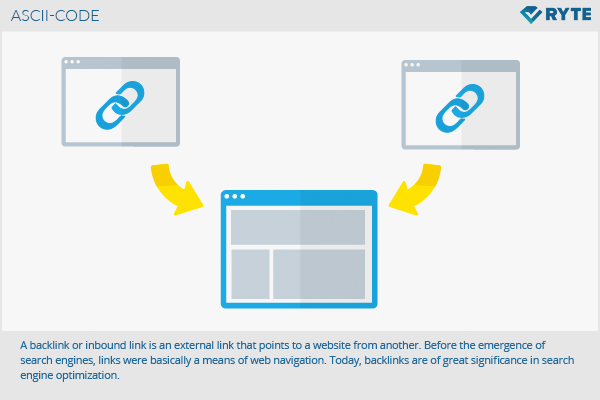Backlink
A backlink or inbound link is an external link that points to a website from another. Before the emergence of search engines, links were basically a means of web navigation. Today, backlinks are of great significance in search engine optimization. The number of backlinks is often interpreted as an index for popularity or importance of a website and shows whether a page is regarded highly on the web (link popularity).
Value
There are different factors that determine the value of a backlink. Backlinks from authoritative pages, i.e., those that come from the so-called trusted domains and whose links are relevant in terms of context, are very valuable. If both pages are relevantly linked to each other with respect to the context, the backlink is regarded as being relevant and is rated highly by the search engine. If a backlink is trustworthy and topic-relevant, it can have a strong influence on the search engine rankings of the linked website.
A backlink is not only a recommendation of the content, but is also an “editorial voice” for the website. In order to identify all the backlinks of a website, different tools such as the Fresh Web Explorer Software can be used.
Anchor text
Another important factor is the anchor text of a backlink. The anchor text is the descriptive label of a hyperlink. The anchor text also appears within the text depending on how it is declared. Google thoroughly reviews anchor texts in order to determine the relevance. Here as well, “unnatural” anchor texts were often generated in the past.
Importance for SEO
Search engines often review the number of backlinks on a page to determine the popularity and importance of the website on the internet. Google’s algorithm and the PageRank System are based on the logic that a page that links to another page views it as a recommendation. The assumption is that the more backlinks a website has, the better will its placement in the search results be. These assumptions led to the aggregation of spamming methods of some search engine optimizers, e.g., the placement of as many inbound links on their website as possible. To do this, article directories, etc. were also exploited. The result was emergence of link farms and link sellers who massively tried to manipulate the search engines.
Today, the quality of a backlink is more important than the number of external inbound links. Through certain Google algorithm updates such as the Penguin Update, Google is now able to identify and penalize qualitatively poor links. To some extent, it is also dangerous to use prohibited link building methods since one risks having their entire domain banned from the search engine index and/or a different penalty. Rationally structured cross-linking with other trustworthy domains can on the other hand be beneficial for the ranking.
Web Links

